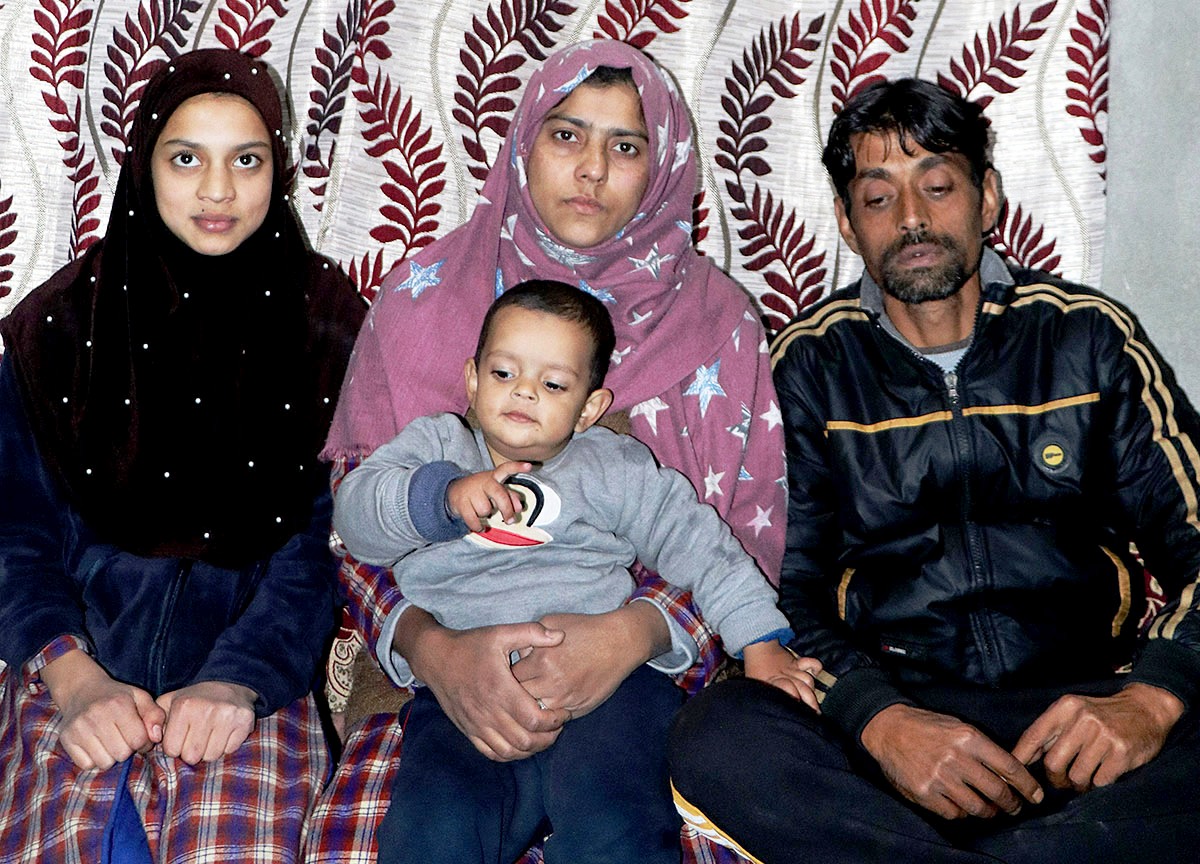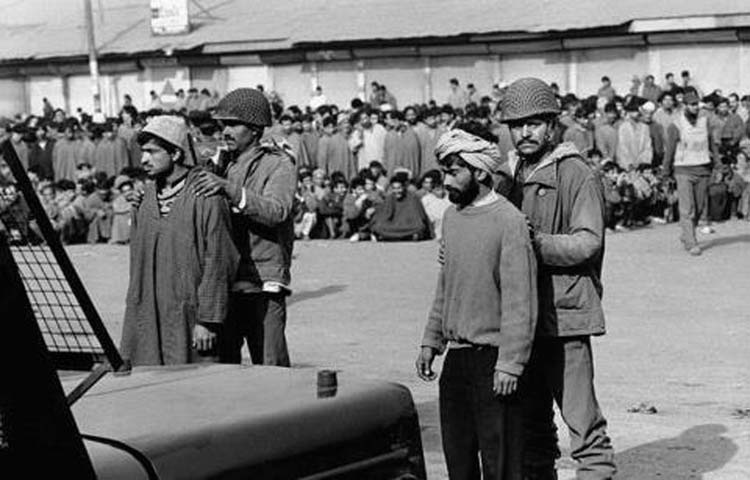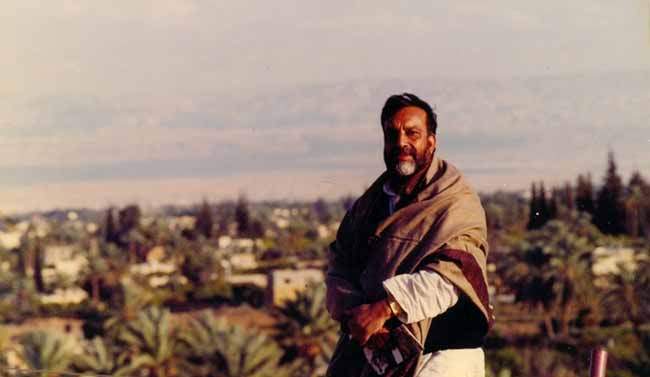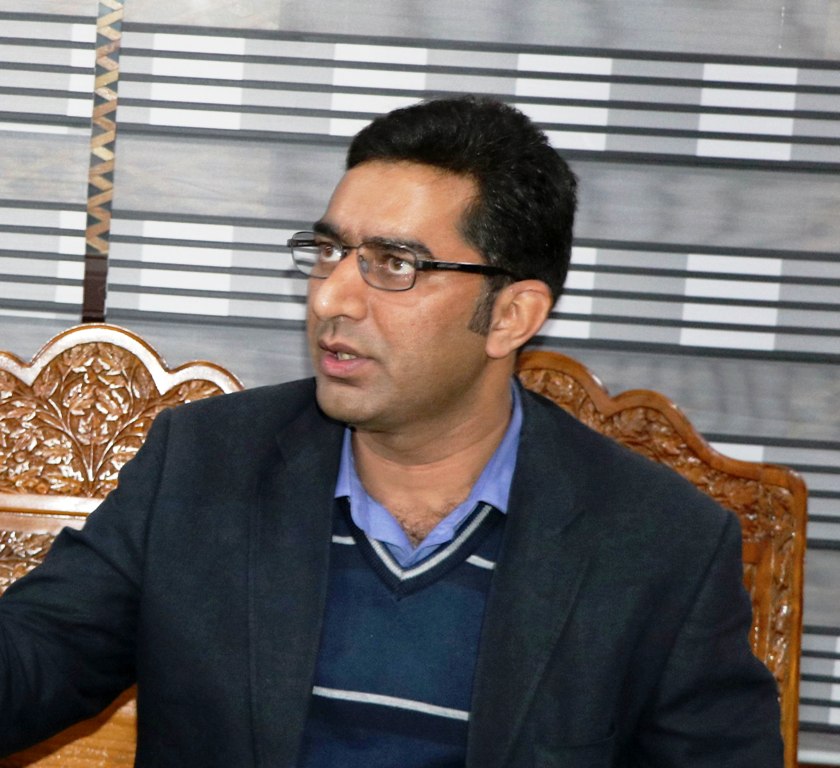Falling in love while in her teens, a lady put an exemplary battle – after her marriage, to secure the release of her husband who was framed in a case and eventually proved innocent. But the battle rendered the family jobless and homeless, reports Saba Gul and Saifullah Bashir

In March 2003, Tabassum got married to the man of her dreams. Then a tenth-grader, Tabassum had fallen in love with Riyaz, a professional taxi driver. “We met through an acquaintance and fell in love with each other,” admitted Tabassum, now a mother of three. “I knew about the police case he had but I was head over heels in love with him”.
Hailing from Chattabal, Tabassum belonged to lower-middle-class family. A student of a local private school, her father was a driver working for Riyaz’s father, Abdul Salam Hajji, who owned a bus, three taxis and was running a wholesale shop in the Qamarwari chowk. Weakened by the stroke of paralysis, Haji got bed-ridden and their lives turned upside down in 1992.
Riyaz’s mother, Salima had to manage the family. “I spent my life in taking care of my husband and raising my children as a single parent,” recollected Salima.“It was hard for me to run a wholesale shop on my own and to bring up my children simultaneously. So, I sold the shop.”
Disturbed by the family conditions Riyaz dropped out in sixth-grade. His elder brother drove a taxi to support his mother. Many years later, Riyaz started to earn by playing an auto-rickshaw.
Kashmir of the 1990s
By then, Kashmir was completely changed by militancy and counter-insurgency. Arrests were rampantly normal, so were deaths and kidnappings. Crackdowns had become a norm those days. In May 1995, army cordoned off the Fruit Mandi Parimpora.“I was identified by an informer and was caught on suspicion,” remembers Riyaz. “They then handed me over to Parimpora police station.”
Salima felt aghast as her neighbour broke the news of Riyaz’s arrest. She pleaded before cops but she had to hire a lawyer to get him out many days later. The life tried to get normal but the family did not know what the future was holding for them.
For some months Riyaz’s family lived in peace but difficult times were yet to come. “We had no idea about his affairs as an auto-driver,” Salima said. “We were shocked to learn that he was arrested again by Parimpora police.”

In October 1995, there was an attack on an Army jeep near PC Dogra Petrol Pump, in which two personnel were injured, of whom G Pullauiah died in the SKIMS. The area was immediately cordoned off and the searches started. Riyaz was driving a passenger and it was searched.
“I didn’t know who he was but I saw the BSF recovering a pistol from him,” said Riyaz. “I pleaded my innocence but I was arrested and dubbed a militant sympathiser.”
Riyaz was first driven to BSF camp in Karanagar where he alleged he was tortured for two months and then shifted to Papa II in Sonawar. There, he spent many months and then moved to Rangreth, another detention centre. His family was assured that he would be freed after six months. But nothing happened as such. Finally, he was shifted to Central Jail Srinagar for two years. He could only move out of jail on bail in 1998. “Once, I was out I heaved a sigh of relief but my life was totally devastated,” admits Riyaz.
Forced by the situation at home, Riyaz picked up the bits and pieces of a broken life to support his mother. With his brother’s support, he started driving a cab to earn for the family. It was during this period that he met Tabassum and eventually married her in 2003.
It was a long Romeo-Juliet story to which both the families reconciled with. However, Salima’s regret was that she should first get her daughter married and then she would think of Riyaz and his bride. But destiny had decided in completely reverse of it.
Young, energetic and cheerful, the bride was in her own world of innocence. She was happy that she managed to achieve the goal of her life by marrying her sweetheart. She was unaware of the harsh realities of started life with a person who was detained and has a case, a fact that started torturing her not many years later.
Spanner In Life
Within a few years, they became proud parents of a son, Moomin Riaz and daughter, Farheen Riaz. They started thinking about their future. Tabassum was taking care of the home as Riyaz would work for long hours on his taxi, driving usually between Srinagar and Baramulla. Living in a joint family was a great help to the family in sailing through the routine. The only aberration of their routine was when he had to attend the court in Srinagar. That day, he would keep his vehicle parked and attend the hearing.
The major crisis came in December 2009 when they were told that his case has been shifted to Varanasi. Busy in preparations of his sister’s marriage he took it lightly and did not believe. With the celebrations over, life started getting serious. The brothers separated but they lived in their ancestral home. “As usual I went to attend the court hearing but to my utter shock, I was told the same thing by officials,” said Riyaz. He met some lawyers but none assured him of success until seven months passed.
Finally, an arrest warrant issued in his name reached Qamarwari Police Chowki. “Busy in finding a way out, I waited for 15 days more which actually worsened the situation,” Riyaz said. “By then, another arrest warrant reached the chowki”.
“It was a huge blow to us and it seemed like the whole world fell apart,” Tabasum said. “My dreams shattered to pieces when an arrest warrant was once again issued in his name.”
Since the case had been transferred, it was the duty of the Jammu and Kashmir Police to hand over Riyaz to their counterparts in Varanasi on, what is called, a transit remand so that he could face the trial. When Riyaz presented before the police, they said they have no idea about the place and they have nothing in place to manage his transfer to Varanasi. Given his innocence, Riyaz did not want the Varanasi police to come and arrest him.
“We hadn’t enough money at that time so we sold our taxi for Rs 2 lakh to meet the expenses of transporting Riyaz to Varanasi,” Tabasum said. “My husband himself managed to sell the vehicle and bore not only his own costs but also of the accompanying cops. He left with an anticipatory bail in his pocket.” His brother and brother in law accompanied him.
In Varanasi
Once they reached Varanasi, Tabassum’s brother in law went to hire a local lawyer for Riyaz’s trials. He remained at a hotel room along with the two cops who accompanied him. While the family was busy hiring a lawyer, the local police authorities confiscated his bail and formally arrested him in absence of his family members. The relatives accompanying him returned shocked and crying.
Thus, began Tabassum’s painful journey of fighting for her husband and their children. It marked the birth of a new Tabassum.
“After 15 days of his detention I along with my family left for Varanasi to meet him,” Tabassum said. “We collectively spent Rs 60,000 on the travel but unfortunately, we weren’t allowed to see him.”
The Varanasi police told them to bring written consent from Parimpora police station, which is mandatory for a meeting! By the time, they returned home, they were too low on funds.
The ICRC Gets In
To her fortune, it was the International Committee of the Red Cross (ICRC) that came to her help. “I was astonished when a lady from ICRC visited our house. She had met Riyaz in jail” revealed Tabassum. “The lady briefed me about my husband’s plight and offered some monetary help”.

ICRC, an international organisation had been permitted by the Government of India, after a lot of pressure to start working in Jammu and Kashmir especially on the prisoners’ front. They would visit jails, help families, meet them, suggest officials about how to improve the situation in the jails. Their intervention led to the upgrading of a number of ad-hoc interrogation centres and ad-hoc jails to the formal jails managed by the law of the land. Some of the ad-hoc facilities run by commandants of the paramilitary forces were closed down on ICRC recommendations.
Next time, Tabasum went to Varanasi, she was helped by ICRC to stay in a hotel room. With police consent in hand, the police did facilitate her meeting with her husband.
No Help
Counselled by family and relatives, in 2010, Tabassum approached the then Chief Minister, Omer Abdullah, and sought his intervention in getting her husband freed or, at least, transferred to Srinagar. Tabassum remembers Omer telling her that he is “helpless” as his authority is restricted up to Lakhanpore. “He told me that it was beyond his authority,” Tabassum remembers. “He only issued a BPL ration card in my favour and nothing else.”
Tabassum knocked the doors of all the top police officers. “I dropped several requests to Mehbooba Mufti but she did not pay any heed to my grievances”, regretted Tabassum.
Her second visit cost her Rs 45000, the amount she had been able to save from the sale of her husband’s cab. She was happy, however, that she was able to hire a lawyer at Varanasi with the sole objective of getting him bailed out. “I had applied for his bail at Allahabad High Court. But unfortunately, they refused. Despite various summons issued by the court, the witnesses did not bother to come. (mai wahan se rotay rotay wapas aayee) I was disheartened and came back to Kashmir crying,” she remembers.
Back home, her small family’s survival became difficult as there was no source of income. Salima was aged and Tabassums’s in-laws had to feed their own families. Tabassum had to visit Varanasi after every fifteen days. She had to take care of the education of her kids too. Finding no option, Tabassum started seeking help, sometimes, even alms from her relatives and friends.
“ICRC helped me a bit. They used to give me a package after every six months to visit Varanasi,” Tabasum admitted. “Apart from that my maternal relatives lent a helping hand. Some people from our area also paid zakat to me.”
For the third meeting, she lacked resources to visit Varanasi. “All the saved money had finished and there was no other option left for me but to stay in Srinagar”, said Tabassum. So instead of Tabassum, her mother in law and brother in law decided to visit Riyaz.
Bhim Singh In The Frame
As the family was returning from Varanasi, they somehow decided to see Prof Bhim Singh, the Panthers Party leader, who was practising law at the Supreme Court. Singh was then taking the case of Kashmiri detainees. After going through the case history, Singh agreed to help them and get Riyaz out on bail.
Seeing a flicker of hope in Singh’s promise, she felt the dire need of finances so that she could bring her husband back. So, she told her in-laws in what normally seems to be an ‘indecent’ proposal – to sell the share of her husband’s property. Not able to have any other option, they agreed.
“We sold second Tavera for Rs 3.5 lakh and I visited Varanasi myself along with my two children and some family members,” Tabasum said, “That was my last visit, the money that I had with me finished as I stayed there for one month for court proceedings.”
Tabasum said those days were the harshest of all. She and her minor children used to eat once a day in order to save a penny. It took a toll on their health, especially that of Tabasum. Then, she visited Singh and narrated her plight to him. Moved by Tabassum’s condition, she told her to arrange funds for her travels only as he would not be charging her for his service. She remembers Singh telling her: “Aap aane jaane ka kiraya arrange karo baki mai aap ke case me paise nahi lunga.
Assured that something will happen, she was returning home, when she got a call from Singh who informed her that Riyaz will be granted bail soon. However, he told her to arrange Rs 40000 for the bail bond. As soon as Tabassum reached Jammu, she stayed in a rented room funded by ICRC.
Tabassum arranged the money for a bail bond and sent a parcel to Singh. Riyaz was granted bail and Tabassum’s happiness knew no bounds. The other happy news that Singh gave her was that he has ensured his case is transferred to Jammu High Court with a direction to conclude the trial in one year.
Though it was better but still for a woman like Tabasum rendered pauper by the situation, it was very expensive to visit Jammu twice a month. Riyaz did reach home but he was not in a position to do any work. Both his taxi cars had been sold to get him out of the jail. There were no savings either and nobody was working. Back home, he developed an acute disc problem due to torture and severe punishment in Varanasi jail.
The family remained to shuttle between Srinagar and Jammu for three years. It was expensive and painful. “We used to promise cab drivers that we will pay the fair once we will get money,” said Tabassum. “Some of the drivers would understand the plight of a fellow taxi driver who has sold two of his taxis to come out of jail.”
The family continued suffering, especially their children. They lacked basic necessities, sometimes even food. She was scolded many times by school authorities for not paying fees on time. Her in-laws stopped helping her. She was hugely indebted.
Frustrated and depressed, once Tabassum lost the track and instead of Jammu reached Delhi. Later she sent a written application to Jammu lower court that she missed the train and could not come for a trial.
Acquitted Finally
But every tunnel has an end. In May 2015, the trial court decreed that Riyaz was innocent. “My husband rang me up and told me that court has freed him from all charges,” Tabassum said. She remembers the actual sentence: “Judge sahib ne muj se kaha ke ab aap ko yahan aane ke zaroorat nahi kuyn ki ab aap ba-izat bari ho gaye hai.It was the happiest day of my life.”
Once Riyaz was back home, the situation changed further. Now everybody started seeing the family a normal one, even though it was bankrupt and hugely abnormal. At the relatives’ level, all help stopped.

“I used to cry profusely and pray for days and nights. Now my eyes have developed dark spots,” Tabassum said.
With no source of help, Tabassum approached JK Bank for a loan of Rs 90000 on her handicraft card. The loan was granted and liabilities were so huge that she could barely see where the money went.
In order to pay off her debts and to support her living, Tabassum’s mother in law finally sold her house and distributed the money among her children. Tabassum got Rs 21 lakh for her share in 2014. After selling the house, her family started living in a two-storey house of her brother in law for which they paid six lakh rupees.
Riyaz’s disc problem was getting aggravated. While treating him, the family decided to buy a cab in 2016 with the left money and resume work.
They chose a bad year for acquiring their second hand Innova. It was the year of the unrest. Six months into unrest, Riyaz sold the same for four lakh rupees, a loss of three lakh rupees. After thirteen months they bought a new auto-rickshaw but due to Riyaz’s ill health, they sold it too. With this, the miseries started increasing for the family. To find a way out “in 2018 my husband started driving taxis of other people to earn a living with debilitating health,” said Tabassum.
Still In Crisis
But the help came from unexpected quarters. In 2018, Tabassum visited Deputy Commissioner Srinagar, Dr Shahid Iqbal Choudhary. After hearing the young mother patiently, he gave her Rs 15000 from Red Cross to fund the tuition fees of her kids. “He also gave Rs 4000 from his own pocket to my one-year-old son. I am highly thankful to Shahid sahib. He really helped me,” she said.
Shahid Iqbal told her that if she wanted any compensation or loan, the government is willing to provide her. But Tabassum refused, she told him that since her husband was medically unwell so it won’t help her in the long run. “I requested for a class IV job for my husband so, that the future of my children remains secured,” she said. “He did assure a job and I am waiting for that.”
For all these years, while chasing the case and seeking help, Tabassum said she was abused, scolded and even taunted by officials. For meeting an official, she would wait for hours.
Last week, her son started writing his tenth-grade examination but has still his school fees outstanding. She says she has been unfortunate because she is not able to give her kids even small thing they desire.
For all these years she had no time even to think. Now she rewinds her memories and has come to the conclusion that the basic fault with their lives was played when her husband was arrested as a teen for no reason. This, she believes makes the law enforcing agency responsible for her plight – the arrest of her husband, the distress sale of her three taxi cars and the home. She is seriously thinking of starting a new battle for justice. Will she do it and if at all she does, will she succeed?















